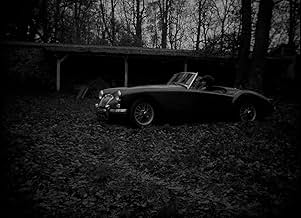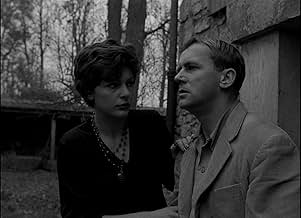Anne Goupil, studentessa di lettere a Parigi nel 1957 va a una festa con il fratello maggiore. Lì incontra Philip Kaufman e Gerard Lenz che commentano sull'apparente suicidio del suo amico J... Leggi tuttoAnne Goupil, studentessa di lettere a Parigi nel 1957 va a una festa con il fratello maggiore. Lì incontra Philip Kaufman e Gerard Lenz che commentano sull'apparente suicidio del suo amico Juan, un attivista spagnolo.Anne Goupil, studentessa di lettere a Parigi nel 1957 va a una festa con il fratello maggiore. Lì incontra Philip Kaufman e Gerard Lenz che commentano sull'apparente suicidio del suo amico Juan, un attivista spagnolo.
- Regia
- Sceneggiatura
- Star
- Premi
- 1 vittoria e 1 candidatura in totale
- Ida
- (as Louise Roblin)
Recensioni in evidenza
Jacques Rivette's first feature shows the gelid calm that appeared in most of his movies. with politics and assassination merging in a manner that Hollywood would only tackle in the 1970s.... usually with an air of hysteria. There are a lot of shots around Paris that makes the city a cynical observer of these human goings-on, a subjective camera that views the affair with contempt. I wonder how cameraman Charles Bitsch got that effect.
Well I'm not a big fan of New Wave (or free-form jazz), so it was rather begrudgingly that I watched this film. Surely enough, it begain in a sort of expressionistic delirium, prompting me to say, "oh great. here we go again. haiku anyone?" But suddenly it reins in, and a very lucid story materializes out of the haze. I was pleasantly surprised. There are many compelling allusions--if not outright parallels--with the classic play "Pericles, Prince of Tyre" as well as Molière and Goethe. This means that the film adopts a certain bit of structure, which is highly unusual for New Wave. I found it very refreshing. With philosophical overtones of Sartre and Camus as well, it's by far the most head-scratching, beard-stroking New Wave film I've seen, and it's not just existentialistic babble either (although there is a hefty share of existentialism).
Its biggest flaw, however, is that it seems to attacks too many themes at once, and in so doing, it dilutes the power it could have had. There's only so much that can be packed into a film, even if it is 140 mins. As a few other reviewers have pointed out, the ideas presented are truncated. Mere fragments. The director intended this, as we see in a dialogue where two characters discuss how the play Pericles is a very fragmented tale which comes together only at the end. HOWEVER, in the case of "Paris nous appartient", it doesn't seem to come together. Whether this was deliberate irony on the director's part or whether it was just poor execution, I can't say. But either way it left me unfulfilled.
It is possible that I missed something. Perhaps I should see it a 2nd time, but unfortunately it falls just shy of the good-enough-to-see-a-2nd-time mark. I did enjoy it, and I'm glad I watched it, but I probably wouldn't care to see it again.
If you see this movie and agree with what I've written, then I think you'll enjoy the film "Orphée" (1950).
Oh, and just a word about the music in this film (since I've already made the analogy of jazz), it's... well... wacky. It's really the equivalent of jazz improv except with symphonic instruments. At times it fits the absurdity of the moment perfectly. But at other times, especially during the dialogue, it can be a bit distracting. I kept wondering to myself how much better it would have been with just a single brooding piano instead of the experimental orchestra noises. But music is entirely a personal taste, so you may enjoy it.
A sinister undercurent pervades the whole movie: a background plot that is never revealed, or shown directly - it is something that the characters speak to each other about and make reference to. While in other movies the conspiracy plot would have been the central theme, here it is pushed into the background, delegated to a simple object of discussion - the movie instead revolves around the lives of the characters and in particular, the protagonist's, from whose point of view the situation is seen. By bringing the focus onto the characters and their daily lives, illusions and aspirations, the movie manages to to breathe fresh life into what would have otherwise been just another conspiracy film.
A few technical things: The acting is not very consistent. The parisian scenes were very good and the photography was aesthetically pleasing. The music enhanced the atmosphere significantly, though some of its psychedelic overtowns were a bit overpowering at points (making the dialogue hard to follow - if the intention was to transfer the confusion/paranoia to the viewer, it was appropriate, however).
It's not a masterpiece, but it is definitely interesting and worth watching at least once.
In any case, i liked it a lot. Pace is very good for a 140 minutes French art movie of the 60's. It's interesting, it made me invest and i was curious to see where it goes. Great as a time capsule, Paris was wonderful. Actors are great. This is one of the movies that you should watch a second time for understanding it completely. I won't though. It's good but it is not THAT good. Pace was good as i said but it should have been at least 10-15 minutes shorter. For a 140 minutes movie, it should have been more intriguing to call it a great movie. And the ending was probably clever but i didn't like it, so much for nothing.
But there was some brilliant dialogue here. Way too cynical for its time of course. I think this is a timeless movie, hasn't aged a bit. Less obscure than it seems. If this description made you curious too, watch it, you won't be disappointed.
Lo sapevi?
- QuizAs an inside joke, in I 400 colpi (1959) the film Antoine Doinel and his parents go to see is "Paris Belongs to Us", which wouldn't be released for another two years.
- BlooperNear the end, when Pierre is on a public phone at Dupleix, a poster near him reads "DIMANCHE 31 MAI" (Sunday 31 May), advertising a meeting of the Parti Socialiste Unifié. May 31st was a Sunday in 1959, and this scene was filmed in late 1958. However, the film is supposed to be taking place in June 1957, so it makes no sense that a meeting is being advertised nearly 2 years in advance.
- Citazioni
Bernard: You're the guilty ones, with bloodstained hands.
Philip Kaufman: You go too far.
Bernard: Too far? Too far?
Philip Kaufman: What about Mayakovsky? He wasn't Spanish, but he killed himself.
Bernard: Mayaskovsky who?
Blonde à la party: Mayakovsky, wowsky!
[laughs]
- Curiosità sui crediti"Paris belongs to nobody." PEGUY
- ConnessioniFeatured in Cinéma, de notre temps: Jacques Rivette le veilleur: 1-Le jour (1990)
I più visti
- How long is Paris Belongs to Us?Powered by Alexa
Dettagli
- Data di uscita
- Paese di origine
- Lingue
- Celebre anche come
- Paris Belongs to Us
- Luoghi delle riprese
- Pont des Arts, Paris 6, Parigi, Francia(2 scenes on bridge)
- Aziende produttrici
- Vedi altri crediti dell’azienda su IMDbPro
- Tempo di esecuzione
- 2h 21min(141 min)
- Colore
- Mix di suoni


































